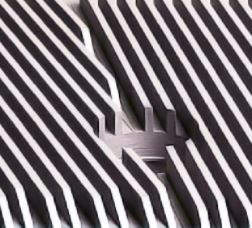ULTRA-LOW INTENSITY REFINING

THE SCIENCE OF REFINING
The refining process is considered by many to be the heart of papermaking. It is in the refiner where the fibers are prepared for desired sheet bonding, bulk, and surface properties. Generally the improvement will be a balance of what has the most impact for an individual mill - reduced energy use, improved strength or longer plate life.
AFT Finebar plate technology is optimum for all fiber types. Plates are custom designed to meet the specific needs of a given mill - balancing fiber quality with paper making needs.
ALL FIBER TYPES
Virgin hardwood pulps
Kraft softwoods pulps
Mechanical pulps
Semi-Chemical pulps
Recycled fibers
HARDWOOD PULPS
For hardwood pulps, the benefits of refining at ultra-low intensity to achieve greater bulk and opacity at a given strength have long been recognized. Before Finebar, the lowest intensities targeted were 0.6-0.8 Ws/m due to limitations in plate manufacturing. With bar widths as fine as 0.8 mm, Finebar plates have driven the industry to new levels in refining efficiency by achieving intensities of 0.1-0.5 Ws/m while maintaining hydraulic capacity. Mill results have demonstrated a range of benefits, including:
Strength gains of 5-10% due to optimum fiber fibrillation and bonding
Greater bulk at a given freeness by maintaining fiber length and minimizing fiber collapse
Reduced fiber picking due to greater development of fibers and reduced size of large vessels segments
Energy savings in the order of 10-15% from more efficient refining
Better runnability on the paper machine as a result of more uniform fiber properties
FINEBAR MINISEGMENTS™
PLATES TO FIT YOUR NEEDS
RECYCLED FIBERS
AFT custom engineered components are made for your specific fiber and output needs. Our application and service engineers will help you achieve what is needed for your process.
Recycled fibers benefit from low intensity refining because they have already been processed and require a very gentle treatment to minimize fines generation. Finebar plates improve fiber quality development and achieve target specifications at higher drainage levels. Plate pattern selection depends on the recycled fiber mix and are evaluated for each mill to handle content variations in corrugated OCC, mixed MOW, deinked fibers and fiber age.
MECHANICAL AND SOFTWOOD PULPS REIMAGINED
Mechanical pulps are prone to fiber cutting during low consistency refining due to the stiff nature of these fibers. Finebar's ultra-low intensity treatment enhances fiber flexibility and bonding with minimal fines generation. This allows for a greater amount of specific energy to be transferred to the fibers to increase strength, improve surface properties and reduce shives - without sacrificing drainage.
For softwood pulps, low-intensity refining was long considered unsuitable due to the increased energy required to achieve strength improvements. However, this view is changing as mills seek to maximize the gains in tear strength and toughness that lower refining intensity can provide, typically at high drainage rates to improve paper machine capacity. As an added benefit, significant increases in plate life have been demonstrated compared to conventional plates.